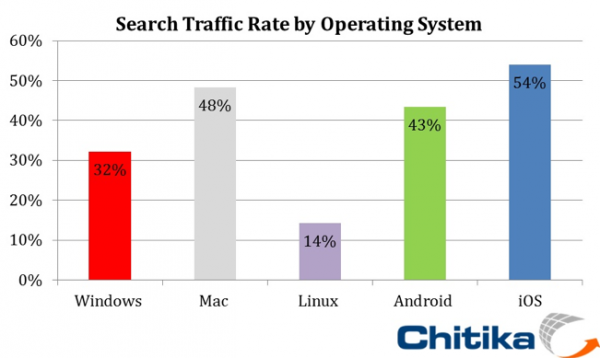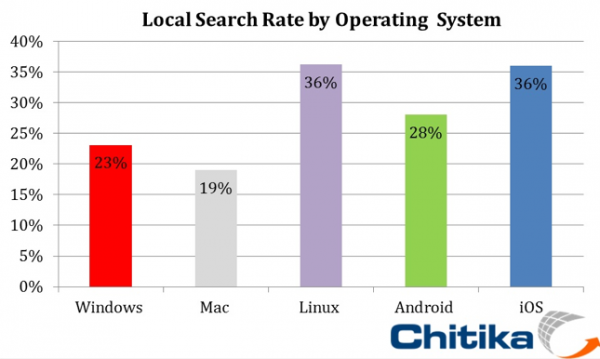More (Local) Searches Coming From iOS Than Android — Study
Ad network Chitika, which regularly publishes findings from activity on its network, has released some data that show owners of iPhones and iPads search more than Android owners. This is a bit counter-intuitive and unexpected, given how prominent search and the search box are on the homescreen of most Android handsets and how deeply integrated […]
Ad network Chitika, which regularly publishes findings from activity on its network, has released some data that show owners of iPhones and iPads search more than Android owners. This is a bit counter-intuitive and unexpected, given how prominent search and the search box are on the homescreen of most Android handsets and how deeply integrated Google is into that experience.
Chitika “looked at hundreds of millions of impressions between April 8 and 14 and broke down traffic depending on operating system, search traffic, and the type of search query.” The company also broke out local searches (often inferred from the query category).
These data don’t measure activity within or involving apps in any way.

Chitika reported that 54 percent of browser-based web traffic from iOS was being driven via search (Google, Bing, Yahoo, etc.). Chitika didn’t report the breakdown of that traffic by search engine and told me that would require an additional analysis. However other data suggest that Google represents about 95 percent of mobile search traffic coming from browsers.
The data argue that iOS browser activity is more “search-centric” than usage behavior on PCs (Mac or Windows). This is also somewhat counter-intuitive given than search is generally easier to use on a PC than on a mobile device.
In terms of local search, the directional relationship among iOS, Android and Windows is roughly the same as in general search chart. However Mac and Linux-based searches reverse positions in the local search data chart. It’s curious and Chitika didn’t really have an explanation for the phenomenon. I asked whether there could have been an error and I was told essentially “no.”
Chitika is saying that 36 percent of search query volume coming from iOS devices has a local intent. This compares to Google’s 40 percent figure for mobile. In contrast, 28 percent of Android search traffic carries a local intent according to Chitika. Figuring out why is an interesting exercise.
Why would iOS users be doing more local searches than Android users? That’s a version of the larger question about why iOS users might be doing more searches generally than Android users? (Once again, these data don’t reflect or measure activity in apps.)
One partial explanation might be that iOS includes iPads, where there is a lot of search activity. But that doesn’t fully explain these findings.
Contributing authors are invited to create content for Search Engine Land and are chosen for their expertise and contribution to the search community. Our contributors work under the oversight of the editorial staff and contributions are checked for quality and relevance to our readers. The opinions they express are their own.
Related stories
New on Search Engine Land
